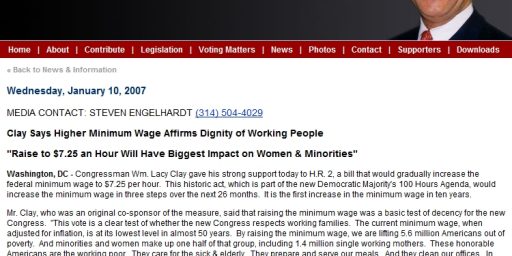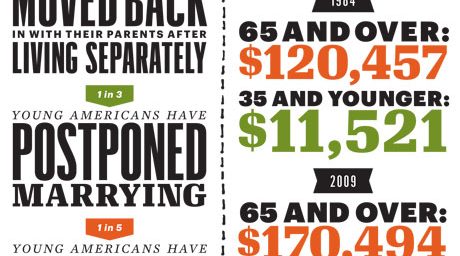Unpaid Internships Unfair, Just Like Life!
Unpaid internships aren't education and give kids of wealthy, well connected parents even more advantages. Should we get rid of them?
As noted here previously, the Labor Department has served notice that it is cracking down on the ubiquitous practice of using unpaid interns to do low level work. Unless the student is truly getting educational value from the experience and the firm is getting little value from the intern — conditions that are seldom met — they should be paid under the minimum wage laws.
TAP’s Rebecca Delaney has an interesting interview on the issue with NYU’s Dalton Conley. Some highlights:
So it’s not just that kids who’ve landed unpaid internships have done pretty well for themselves and have no reason to complain; it’s more that the displaced workers have reason for concern?
I don’t really think many workers are being displaced, but I think that’s the perception. And I agree, actually, with what you said, [which is] also related to the economy. Students who are graduates who’ve had an unpaid internship or internships have an expectation with their unpaid work, their “slave labor,” so to speak. The way they see it, it should lead to a real job, and maybe that was commonly the case during the boom time when labor was short. But now, and I don’t think anyone has statistics on this, there’s less likely to be a job at the end of the rainbow. It might engender bitterness among the interns themselves.
But that’s rather a self-correcting problem, no? If internships turn out not to lead to better jobs, people will presumably find out about this and quit doing them? But my strong guess is that it’s not the case. Internships are a way to get one’s foot in the door and impress people who are doing the hiring, such as it is. Of course, that masks the thing that’s actually insidious about internships:
So let’s say the government is successful with its crackdown on illegally unpaid internships. Aren’t financially privileged students — the kinds of kids whose parents are yachting buddies with the lieutenant governor — still going to have an easier time snagging a paid gig? Is there any way to compensate for the fact that less-affluent students lack social connections that so often lead privileged students to prestigious internships?
Would Dad’s friend in the governor’s office or in the executive suite find some extra cash for little Johnny or James to, even if it’s minimum wage, spend some time there that summer? Maybe. There’d probably be fewer [internships], but I don’t really think that will address the issues you mentioned of social connections and social capital. Some folks have advantage over others. But if you try to correct that, you get to a level of micro-managing where it becomes almost like a joke.
When do you stop, right?
Yeah, it gets to where, for anyone to be in a summer internship, you have to do an ad in the newspaper and vet all resumes, and probably the connected person would still get it, because we trust the people we meet through connections. People don’t get hired over the transom, usually. It’s not never, but you’re certainly at a disadvantage coming over the transom versus through social connections to the employer. That’s not going to change, and if we try to change that, we sort of marry bureaucratic controls and hiring policies to the economy at large, and there’d just be an uproar. We can’t do that.
Conley also brings up a point seldom made here: It’s not that students are getting gypped out of education but that they’re getting educational credit for work that’s not educational:
But do you think that some sort of effort spearheaded by universities to better monitor what their students are doing — to at least make sure that internships are in compliance with the law — would be helpful?
There’s a second issue here about whether universities give course credit, in fact charge tuition, for kids to do internships. That’s ridiculous to me. And we’re often under pressure because the students want that. I know a student who came to me, and she landed an internship at Vogue, and she was so excited because it’s her dream job after graduation. She kind of sold herself there as, “You don’t even have to pay me. I’ll get course credit for this.”
Oh my. I’m sure that went over really well with you.
Yeah, she came back, and she wanted me to approve this, and I said, “This is not what you come to a research university for.” I don’t feel comfortable that she’s going to pay NYU tuition to go do something that [she] doesn’t really need to be in a university for.
And this historical note is interesting:
Yeah, it seems like that compounds problems that already exist as far as inequality goes. I mean, if you can’t afford to work for free, you certainly can’t afford to shell out money for tuition on top of that.
Right, although, you know, this movement came out of a very progressive view of education from the ’60s that life experience is equally valid as classroom experience. And that was meant to help the working class. It just kind of goes to show that things come back to bite you all the time. There are so many unintended consequences.
If we can’t ever get rid of inequality completely, won’t improving the ratio of paid-to-unpaid internships at least correct the system so that students from humbler backgrounds aren’t completely shut out from opportunity?
That’s true, yes. But I think — I’m not sure how many unpaid internships would be replaced by paid ones. I think, mostly, that they’d go away. They’re not that valuable to the employer. Then, we’d really be talking about temp work or seasonal work — and the labor unions get upset about that too. So I’m not sure. These issues, of how inequality reproduces itself, are just so sticky that it’s really hard to in advance design something that’s going to be robust enough to solve them.
Conley understands that these are “problems” without solutions, which, as Shimon Peres pointed out, aren’t actually problems at all but facts to be coped with. The children of rich, connected parents have unfair advantages over the children of poor, less connected parents in obtaining prestigious jobs. Internships exacerbate that problem but also provide an avenue that some of the latter can take advantage of. And getting rid of unpaid internships won’t create “fair” paid internships, or other paying jobs.
So . . . what’s the point of cracking down?







I’d dispute your claim that kids don’t get educational value from internships paid or unpaid. It depends a bit on the individual of course but based on experiences in my own family I’d say they had quite an impact, semi transformative in one case.
I agree that there is some educational value in internships-maybe not all, and I think it probably depends on area of study. Most of the internships at my university were paid ones (they were actually for a set weekly salary and I think it was for slightly under the minimum wage), but the two internships I did were very valuable as far as what I learned and experienced that just doesn’t happen in a classroom.
I do suspect that in some fields/areas of major that the unpaid internship is indeed about making social connections, but once again if an adult (and college students are adults) want to work for a summer or semester without pay in the hopes of gaining a leg up on the competition, then let them. If they don’t want to work without pay, they can either not take the unpaid position or quit.
Honestly I think this is mostly tinkering. If the internships have absolutely no value to the student who does it without pay, the students will eventually stop signing up.
“I will gladly pay you Tuesday for a hamburger today.”
There’s not much doubt that internships can be eye-opening in terms of learning about one’s prospective line of work. But that’s not the same thing as “education.” Indeed, work and education are generally pretty distinct entities.
This is already affecting several programs that require “supervised experience.” Stuff I did in high school to gain some skills… can’t do now.
I work in the film business and I have little doubt American movies would be a bit better if it weren’t for unpaid internships. As is, it’s impossible for a non-wealthy kid to really break into the studio system; upwards of a year of unpaid work is almost mandatory, and Hollywood is the ultimate “who you know” business. Our hiring pool of potential is therefore severely limited.
So if you like good movies, outlaw the unpaid internship!!!
“There’s not much doubt that internships can be eye-opening in terms of learning about one’s prospective line of work. But that’s not the same thing as “education.” Indeed, work and education are generally pretty distinct entities.”
Work is not educational? I’m bound to say you have some very weird ideas at times Jim. At it’s most obvious, like a medical internship, it’s an integral part of a doctor’s educational process. Or an apprenticeship as a mechanical engineer. Even working in the basement of a wine store over the thanksgiving/christmas holiday can be “an education” in all sorts of ways. Didn’t you find your spell in the military educational?
Dave says:
Saturday, July 17, 2010 at 12:21
” As is, it’s impossible for a non-wealthy kid to really break into the studio system; upwards of a year of unpaid work is almost mandatory, ”
Is this very different from becoming a doctor here or maybe becoming a barrister in Britain or getting a job on a fashion magazine?
I would not like to see unpaid internships outlawed because, from there, it is a slippery slope to governments outlawing voluntary exchange of all kinds that do not involve money..something that would be the biggest loss of freedom yet.
Work is not educational? I’m bound to say you have some very weird ideas at times Jim. At it’s most obvious, like a medical internship, it’s an integral part of a doctor’s educational process. Or an apprenticeship as a mechanical engineer. Even working in the basement of a wine store over the thanksgiving/christmas holiday can be “an education” in all sorts of ways. Didn’t you find your spell in the military educational?
You’re confusing education and training. Granted, universities increasingly do that themselves.
Education: Learning to read, do math, grapple with high concepts,etc. Training: Learning to type, do accounting books, write an operations order.
James not sure I agree with you that internships in a given field that provide experience aren’t educational.
If the internship is in the mail room, then I can agree, but my internships taught me a lot about how the job really is in real life not just academics.
As for outlawing internships, i wonder how this might affect education. Students in school to be teachers have a certain number of required hours they have to work in a classroom along side a teacher at several levels. The universities actually contract with the school for each student they accept a placement for the school gets a certain amount of money (it creates an incentive for the school to accept students). But if somebody has to start paying the students, I wonder if it will affect training (and education isn’t the only field affected, nursing and some others have required supervised type experiences).
Although perhaps some of this training will be exempted, and if that is the case I figure companies that currently accept unpaid interns will figure out a way to meet the exemptions for education, nursing and other students.
“You’re confusing education and training…”Education: Learning to read, do math, grapple with high concepts,etc. Training: Learning to type, do accounting books, write an operations order.”
Jim, there is no difference between education and training. Definition of education:
Education in the largest sense is any act or experience that has a formative effect on the mind, character or physical ability of an individual. In its technical sense, education is the process by which society deliberately transmits its accumulated knowledge, skills and values from one generation to another.